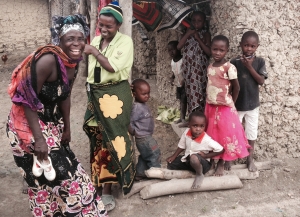
A problem in itself, violence against women and girls is associated with HIV transmission as well as other aspects of global public health and development.
A cluster randomized controlled trial (The Intervention with Microfinance for AIDS & Gender Equity – IMAGE Project) in rural South Africa combined a group-based microfinance intervention with a participatory gender and HIV training curriculum for loan participants and showed that, over a two-year period, levels of physical and/or sexual partner violence experienced by participants in the past year were reduced by 55%.
Maisha – which means “life” in KiSwahili – builds on the success of IMAGE and is seeking to:
- adapt, implement and evaluate the impact of the IMAGE intervention in Tanzania in reducing women’s past year exposure to intimate partner violence (IPV)
- find out if a participatory gender training curriculum delivered to women not receiving microfinance and to their male partners reduces women’s past year exposure IPV
MAISHA comprises:
1) Two cluster randomized controlled trials:
- Component A – 66 groups of women (average 20 women per group) who are already receiving microfinance will be recruited and randomised to either:
- receive participatory gender training in addition to microfinance
or - to continue receiving microfinance alone
- receive participatory gender training in addition to microfinance
- Component B – 66 groups of women (average 20 women per group) who are not receiving microfinance, will be recruited and randomised to either:
- receive participatory gender training along with their male partners
or - to receive no intervention
- receive participatory gender training along with their male partners
2) A complimentary in-depth qualitative study to:
- learn more about the factors that contribute to women’s vulnerability to violence
- to better understand how the different intervention models impact on the lives of intervention participants and their families
- how the different intervention models may reduce this risk
3) An integrated process evaluation to explore the implementation, receipt and context of the interventions.
4) An economic evaluation to evaluate the total costs of the development and implementation phases for each of the trials.
A STRIVE project, the MAISHA study is a collaborative effort of:
- the Mwanza Intervention Trials Units (MITU)
- the Tanzanian National Institute for Medical Research (NIMR)
- the London School of Hygiene and Tropical Medicine (LSHTM)
- BRAC Tanzania
In Tanzania, the study is led by Dr Saidi Kapiga, Dr Gerry Mshana and Dr Sheila Harvey. In London, the study is led by Professor Charlotte Watts and Dr Shelley Lees.
Resources
Publications
- Prevalence of intimate partner violence and abuse and associated factors among women enrolled into a cluster randomised trial in northwestern Tanzania
- A cluster randomized controlled trial to assess the impact on intimate partner violence of a 10-session participatory gender training curriculum delivered to women taking part in a group-based microfinance loan scheme in Tanzania
Impact case study
Video
- Maisha - Life - 11-minute video
Other resources
Background documents
- Understanding the impact of a microfinance-based intervention on women’s empowerment and the reduction of intimate partner violence in South Africa
- Effect of a structural intervention for the prevention of intimate-partner violence and HIV in rural South Africa: a cluster randomised trial
- A combined microfinance and training intervention can reduce HIV risk behaviour in young female participants
- Economic evaluation of a combined microfinance and gender training intervention for the prevention of intimate partner violence in rural South Africa



